Looking for an alternative to Xfinity (Comcast) for home internet service? You have almost certainly heard about T-Mobile Home Internet and thought the pricing sounded too good to be true. $50 per month for unlimited data and prices as low as $30 per month with select T-Mobile cell phone plans and autopay. This is obviously very competitive pricing which is an area that T-Mobile never fails to impress. T-Mobile is constantly shaking up the market with truly disruptive pricing.
How does T-Mobile Home Internet compare with Xfinity? I tested them hands-on, took a variety of measurements, and tried using them as my primary internet service for 30 days. I then analyzed the data and made comparisons. 5G vs. Cable tested hands-on.
TL;DR Answer: Xfinity offers faster speeds than T-Mobile Home Internet and better connection stability. T-Mobile Home Internet is best for those who are looking for a less expensive alternative and are willing to sacrifice performance significantly in the process. For most people, Xfinity is going to be a better option.
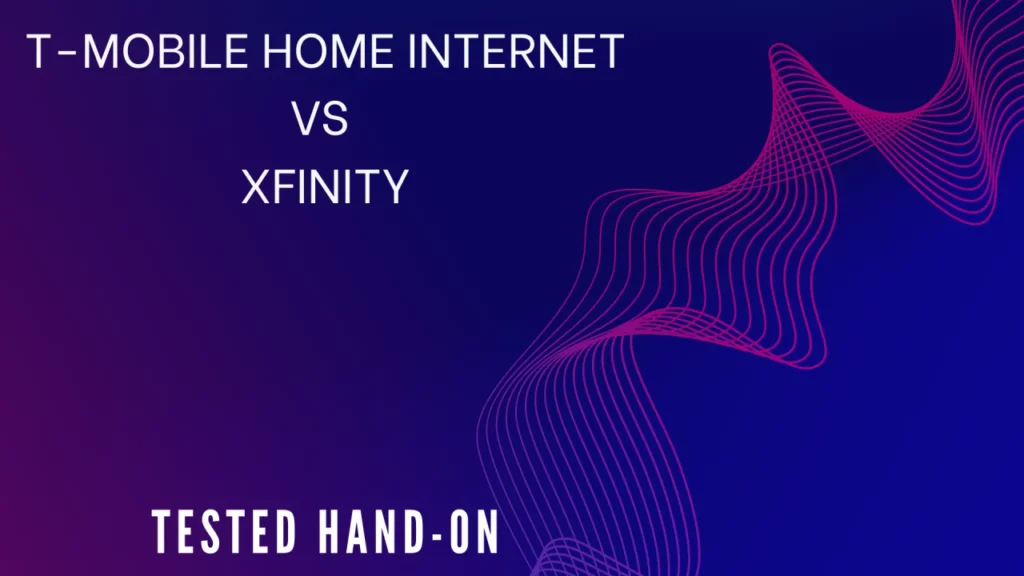
Table of Contents
Price
T-Mobile’s 5G Home Internet plan is taking the world by storm. T-Mobile is promising unlimited data for truly disruptive prices. T-Mobile has a good reputation for increasing competition and driving down prices. This is great for customers who benefit from the lower prices.
Currently, you can get T-Mobile Home Internet for $50 per month or for $30 per month with select T-Mobile Cell Phone Plans. The prices you see include all taxes and fees. T-Mobile is 100% transparent about what you pay, with no hidden fees or price increases. There are also no contracts.
Transparent pricing is something that T-Mobile is a true leader in. I would like to see other telecom providers follow suit. Transparent pricing is better for consumers as it avoids surprise charges and fees.
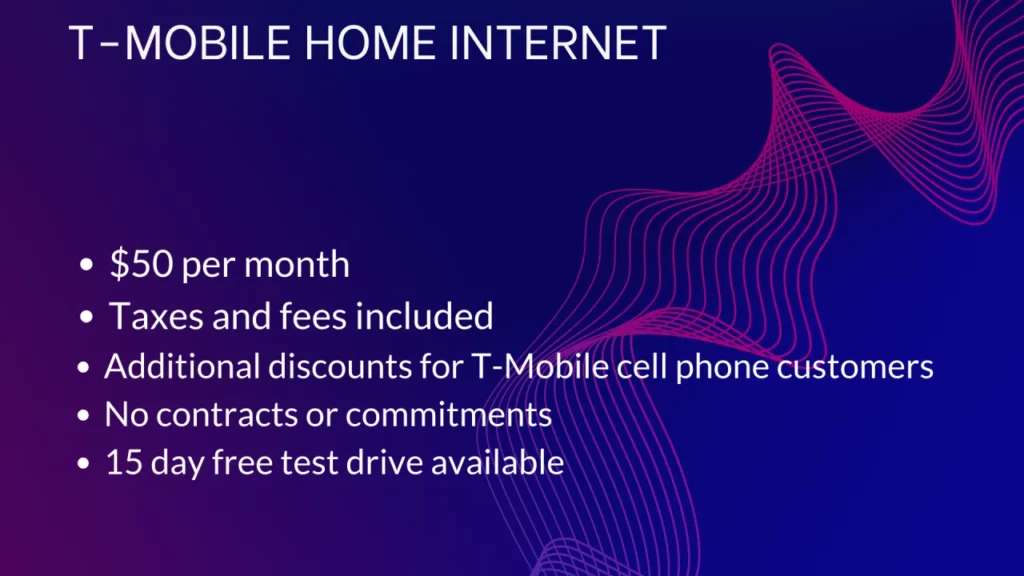
Xfinity offers a variety of internet plans ranging from $24.99 to $299.95 per month. Unlike with T-Mobile Home Internet, the pricing with Xfinity is much less transparent. Taxes and fees are also an additional expense with Xfinity (Comcast). Modem rental with Xfinity will add an additional $15 per month to your bill. However, as with most cable internet services, you can easily avoid paying for this by using your own modem.
The other difference is the use of promotional pricing. Xfinity frequently runs promotions where you can get your first 6 months, first year, or even first two years at a discounted rate. After that period ends, your rate goes up to full price, which is oftentimes much less advertised.
With T-Mobile Home Internet, there is no promotional pricing, and the T-Mobile Home Internet gateway is included in the monthly service cost. The price you see is the price you pay. For many customers, this transparent pricing model makes T-Mobile Home Internet highly attractive.
Price Winner: T-Mobile Home Internet
Availability
T-Mobile Home Internet and Xfinity are both available to millions of subscribers. Coverage regions will vary, and depending on your service address, you may have one or both options available to you.
Xfinity currently has service in select areas of 40 US states. Xfinity tends to focus more heavily on urban areas and the suburbs surrounding urban areas. However, they do offer services in some rural areas. Click to learn if Xfinity offers service at your location.
T-Mobile Home internet is also widely available in the United States. They offer service in select regions of 49 states. They also tend to serve rural areas more comprehensively than Xfinity does.
One limiting factor is cell phone tower capacity. T-Mobile will only sell customers its home internet service in areas where they have enough cell tower capacity to support it. Click to see if T-Mobile Home Internet is available at your service address.
Availability Winner: T-Mobile Home Internet
Speed
Everyone wants fast internet. However, many people have different ideas of what they consider to be “fast.” I tested several of the most popular Xfinity Speed Tiers and compared them to the single tier offered with T-Mobile Home Internet.
Across the board, download speeds with Xfinity were significantly higher than with T-Mobile Home Internet. This is not surprising when you consider that Xfinity is a cable or fiber-based internet service, whereas T-Mobile Home Internet is a fixed wireless internet service.
Xfinity Download Speeds
On Xfinity’s lowest-tier plan, which is advertised as 100 Mbps, I consistently saw speeds of 105 Mbps – 120 Mbps. This speed was consistent at all hours of the day.
I also tested the 400 Mbps plan with Xfinity and was equally impressed. I consistently saw speeds of 410 Mbps – 475 Mbps. This was great to see, especially with so many internet providers over-promising and under-delivering.
Finally, I tested the Xfinity 1,200 Mbps plan. I already knew that the gigabit ethernet I was using was limited to about 950 Mbps and that I would be unable to test speeds higher than that properly. However, after 14 days of thoroughly testing things, I consistently got 947 Mbps – 951 Mbps on every speed test.
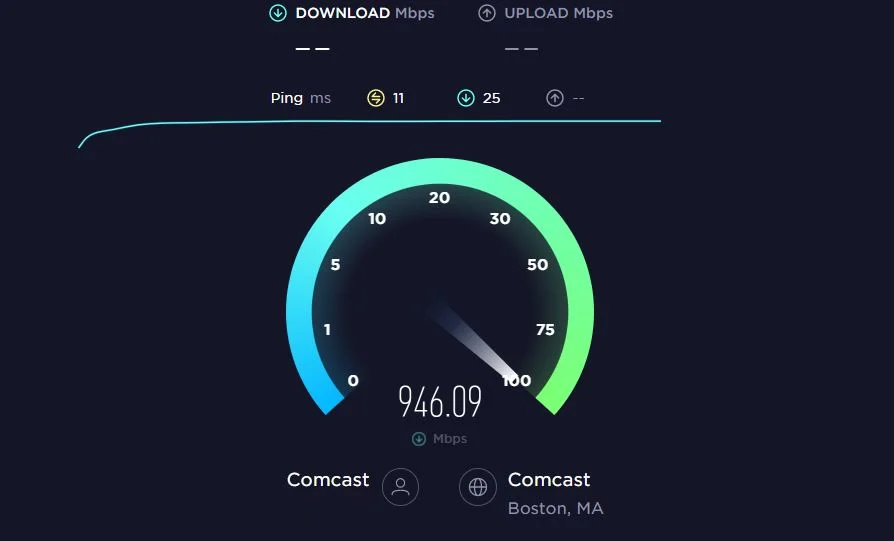
T-Mobile Home Internet Download Speeds
T-Mobile Home Internet only offers a single tier of service. They are also less specific about the kind of speeds you can expect to get. They describe their download speeds with the following verbiage.
“T-Mobile 5G Home Internet customers see typical download speeds between 33-182 Mbps, which is great speed for streaming video, surfing the web, working from home and most types of online gaming. Speeds can vary depending on location, signal strength and availability, time of day, and other factors.”
I followed the installation instructions that came with the T-Mobile Home Internet gateway and optimized my placement near a window as recommended.
Most of the time, I saw speeds between 20 Mbps and 75 Mbps. I never got more than 95 Mbps, which was only on a single day in the middle of the night. During peak hours, download speeds of 20 Mbps – 45 Mbps were the most common.
Xfinity Upload Speeds
Xfinity, as with other cable internet providers, is notorious for not offering the fastest upload speeds. In fact, upload speeds were the second most prevalent reason that people who completed our survey wanted to try T-Mobile Home Internet.
Xfinity upload speeds are advertised as maxing out at 35 Mbps on their traditional cable-based service plans. Some of their lower-cost plans only offer 20 Mbps upload speeds. They offer fiber upload speeds that are 1,000 Mbps or higher.
Based on my testing with Xfinity, I was consistently getting between 35 Mbps and 42 Mbps in upload speed with their higher-tier plans. With the lower tier plan, which is advertised as having 20 Mbps upload speeds, I was consistently getting 22 Mbps – 24 Mbps.
T-Mobile Home Internet Upload Speeds
Upload speeds with T-Mobile Home Internet are not widely published. However, on T-mobile’s official website, I found in the FAQ section that upload speeds of 6 Mbps – 23 Mbps are typical when connected via 5G.
In my testing, speeds of 5 Mbps – 10 Mbps were typical. The highest upload speed I saw with T-Mobile Home Internet was 13 Mbps. During peak hours, 5 Mbps was typical, and sometimes I saw upload speeds of 2 Mbps or less. This is significantly less than what you get with cable internet.
T-Mobile Home Internet vs Xfinity Speed Comparison
Average speeds were significantly higher with Xfinity. For this comparison table, I used the 400 Mbps Xinity plan and the only plan offered by T-Mobile Home Internet.
| T-Mobile Home Internet | Xfinity Internet | |
| Average Download Speeds (Peak Hours) | 30 Mbps | 440 Mbps |
| Average Download Speeds (Off Peak Hours) | 62 Mbps | 455 Mbps |
| Average Upload Speeds (Peak Hours) | 5 Mbps | 22 Mbps |
| Average Upload Speeds (Off Peak Hours) | 8 Mbps | 22 Mbps |
Speed Winner: Xfinity
Latency and Stability
In my testing, Xfinity offered stable and consistent ping of 20 ms or less. This was consistent across all of the Xfinity packages I tested. Rarely would I see a spike of 50 ms or less. Stability was also excellent with Xfinity. I did not have any issues with online gaming or videoconferencing via Zoom.
For people who work from home or play online games, Xfinity is a good option. I found no issues related to latency, ping, jitter, or stability.
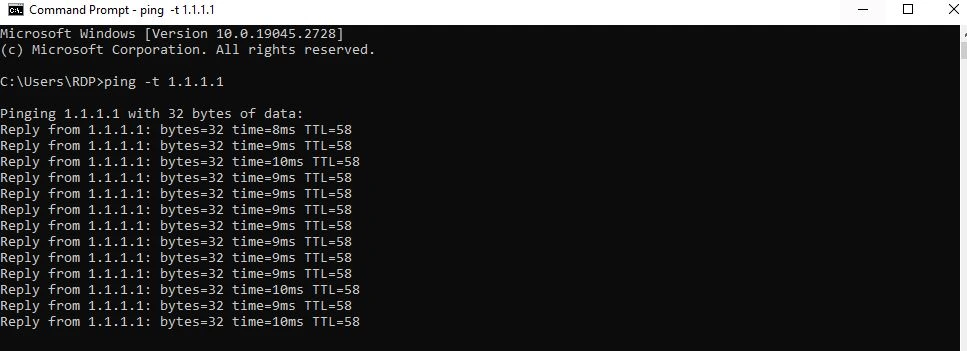
T-Mobile Home Internet was a mixed bag when it came to stability and latency. During off-peak hours when the cell tower was not congested, latency was generally acceptable. I saw pings in the 45 – 60 ms range. This is not terrible but certainly much higher than with Xfinity.
The problem is during peak hours when you probably use the internet the most. Over the course of several minutes, pings would range all the way from 40 ms all the way up to 500+ ms.
Based on my testing, T-Mobile Home Internet is completely unusable for online gaming, video conferencing, and other latency-sensitive applications during peak hours. If you plan to game, avoid T-Mobile Internet.
T-Mobile Home Internet vs Xfinity Ping and Jitter
| T-Mobile Home Internet | Xfinity Internet | |
| Average Ping (Peak Hours) | 200 ms | 13 ms |
| Average Ping (Off Peak Hours) | 50 ms | 13 ms |
| Average Jitter (Peak Hours) | 70 ms | 2 ms |
| Average Jitter (Off Peak Hours) | 20 ms | 1 ms |
Latency and Stability Winner: Xfinity
Gaming Performance
Xfinity and T-Mobile Home Internet are both marketed as being “good for gaming.” I decided to give this a good test. On multiple nights I played competitive games, including Call of Duty, Fortnite, and Halo. I tested performance on PS5, Xbox Series X, and on PC via Steam.
Gaming on Xfinity was generally a good experience. I did not have any issues joining multiplayer matches, as my NAT Type was Moderate. With some basic port forwarding, I was able to get an Open NAT Type with ease. This is easy with Xfinity because they provide you with a publicly routable IPv4 address.
Latency was generally good, with a rare exception a single time when playing Fortnite. However, this appears to be due to congestion on the Fortnite server and unrelated to Xfinity. Games download quickly and without issue.
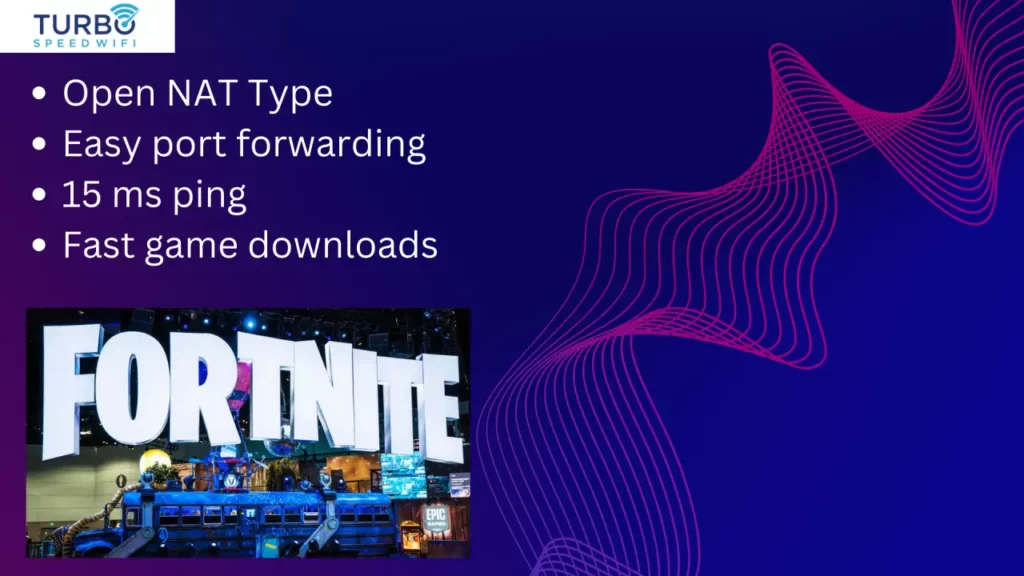
On T-Mobile Home, Internet online gaming was not a great experience. Latency was all over the place, and I was lagging in most multiplayer matches. Call of Duty was completely unplayable on T-Mobile Home Internet.
The other issue with T-Mobile Home Internet that impacted my ability to play games was my NAT Type. It was strict, and I was unable to successfully change my NAT Type to even moderate. On Xbox Series X, I kept getting the Double NAT Detected warning. This is not surprising. Unlike Xfinity, which assigns its customers a publicly routable IP address, T- Mobile assigns private IP addresses to its customers via Carrier Grade NAT (CGNAT).
If you are an online gamer, I would highly recommend Xfinity over T-Mobile Home Internet. Xfinity proved itself to be a reliable choice for gaming. T-Mobile struggled in all of the testing I did. However, it is important to note that your performance with T-Mobile Home Internet could be better or worse, depending on your location and how busy the cell tower is in your area.
Another thing to consider is data caps. Xfinity currently has a data cap of 1.2 TB, whereas T-Mobile Home Internet comes with truly unlimited data. Xfinity does allow you to purchase more data if needed and also offers the ability to pay an additional charge to upgrade to unlimited data.
For the vast majority of gamers, 1.2 TB is more than enough data for the month, and this will be completely a non-issue.
Online Gaming Winner: Xfinity
Reliability of Service
Based on my testing, both services are reliable overall. I did not experience any reliability issues with Xfinity in the 30 days I was testing it out. With T-Mobile Home Internet, my connection was generally reliable. However, it did go out for several minutes at a time on 5 different days.
For this reason, I would hesitate to recommend T-Mobile Home Internet to anyone who needs an absolutely rock solid internet connection. You would not want to be on a Zoom call with your boss and have this happen to you. If you need a reliable internet service provider, Xfinity is a better option.
Reliability Winner: Xfinity
Customer Service
Telecommunications companies are notorious for offering bad customer support. Based on my interactions with customer service from both Xfinity and T-Mobile, I would consider both to be about equal.
Xfinity tech support reps came across as more knowledgeable, in my experience. They also tended to provide better solutions that led to faster resolutions of issues.
The T-Mobile reps I spoke with were all friendly and easy to understand. The issue I ran into was the support rep was trying to get me to set up port forwarding when in fact, port forwarding would never work with T-Mobile Home Internet because they use CGNAT on their network. This would be extremely frustrating to a less tech-savvy user.
The challenge with Xfinity was when I went to cancel my service. They transferred me multiple times and made the process as difficult as possible. The total process took over an hour from time of calling to time of being canceled.
T-Mobile Home Internet, on the other hand, was fast and easy to cancel. I was able to cancel my service within 15 minutes of calling, and they did not transfer my call multiple times. I did have a few issues with returning the equipment, and T-Mobile took longer than expected to acknowledge that their equipment had been returned.
Overall I would say my customer service experiences with Xfinity and T-Mobile were both less than perfect but not totally bad.
Customer Service Winner: Tie
Feedback From Users Who Completed My Questionnaire
Jim from California,
“I switched to T-Mobile Home Internet about eight months ago, and it has been great. Previously I had AT&T DSL for internet, and it was much slower. I have been a T-Mobile subscriber for several years and have always had good service.
When I saw on TV that T-Mobile was now offering home internet, I thought I would try it out. Thus far, it has been solid, and I have had no major issues. Speeds are much faster than what I was getting before.”
Elizabeth from Florida,
“I have been using Xfinity for my internet for the last ten years. Every year or so, they jack up my rate, and I have to call their customer service department and enroll in a new promotion. When I heard about T-Mobile offering high-speed internet for $50 per month, I decided to give it a try. T-Mobile sent me the gateway, and I got it set up in a matter of minutes.
Initially, I was getting decent speeds but still less than with Xfinity. For the next two weeks, my internet kept dropping for minutes at a time. As an online business owner, this was a huge issue for me. I called and canceled my T-Mobile Home Internet Service. Fortunately, I had not yet canceled my Xfinity internet service.”
Sabrina from Ohio,
“When I moved to Ohio, I had WOW Internet. It was decently fast and generally reliable. I did not have too many complaints. When WOW got bought out by Breezeline, my bill increased significantly. As someone who only casually uses the internet and does only light streaming, I thought I would look for a less expensive option.
I signed up for T-Mobile Home Internet and received the router from T-Mobile within a few days. I had a little trouble getting my router set up, but once I did, everything just worked. I have had my T-Mobile Home Internet now for over a year, and I love it. Unlimited data at an affordable cost. I do not game and do not work from home.”
Overall Ratings
Based on my objective rating system Xfinity is the better home internet service. However, there were definitely pros and cons to both services. There are also other internet services that you should consider.
| Xfinity Internet | T-Mobile Home Internet | |
| Price | 6/10 | 9/10 |
| Speed | 9/10 | 5/10 |
| Stability | 7/10 | 2/10 |
| Latency | 8/10 | 3/10 |
| Gaming Performance | 7/10 | 4/10 |
| Zoom Call Performance | 7/10 | 5/10 |
| Reliability | 8/10 | 6/10 |
| Availability | 6/10 | 7/10 |
| Customer Service | 5/10 | 4/10 |
| Ease of Canceling Service | 5/10 | 7/10 |
| Overall Score | 68/100 | 52/100 |
T-Mobile Home Internet: Overall Score 52/100
Xfinity Internet: Overall Score 68/100
Overall Winner: Xfinity Internet
Alternatives to Consider
There are several alternatives to Xfinity and T-Mobile Home Internet that you should consider. Of course, you may not have access to all of these services at your service address. Depending on where you live, you will likely have access to one of these alternatives.
- Verizon Fios
- Spectrum Internet
- Starlink Internet
- AT&T Fiber Internet
- Fidium Fiber Internet
- Breezeline Internet
It is always a good idea to look at multiple internet service providers when considering what to choose for your home. Xfinity, aka Comcast Home Internet and T-Mobile Home Internet are both compelling options for a variety of reasons.
Who is T-Mobile Home Internet Best For
If transparency of pricing and ease of canceling is most important to you, T-Mobile Home Internet is likely the better option for you. Xfinity pricing is more difficult to understand, and they hit you with various taxes and fees. Xfinity also uses promotional pricing, which means that your price will jump up in 6 – 12 months.
T-Mobile Home Internet is also best for existing T-Mobile cell phone customers who are eligible to get the home internet service at an even lower price of $30 per month.
I would not recommend T-Mobile Home Internet for people who work from home and need a rock-solid connection to the internet. I would also not recommend it to gamers. For everyone else, it is an option worth looking at if saving money on your internet bill is important to you.
Who is Xfinity (Comcast) Internet Best For
Xfinity is likely a better option for you if you care about having fast internet that is also stable and reliable. Xfinity performed much better in my testing than T-Mobile Home Internet in these key metrics. Xfinity is also a better choice for online gamers who want a stable, low-latency connection.
For people that work from home and use Zoom, Microsoft Teams, Webex, or other online meeting applications, Xfinity is an excellent option to consider. I would highly recommend Xfinity to most people as long as they understand the billing and are okay with the hidden fees and taxes.
My Testing Methodology
I tested Xfinity Internet and T-Mobile Home Internet for 30 days and ran them through some torture tests.
My testing was designed to collect objective hard data via a series of lab tests and to also gather hands-on data from users with real-world feedback via a detailed questionnaire.
Our lab testing measured the following attributes.
- Download speeds
- Upload speeds
- latency and stability
- Reliability
- Gaming performance
- Videoconference performance
Additionally, I evaluated the customer support experience from both Xfinity and T-Mobile for both technical and billing-related issues.
Finally, I conducted a survey with over 1,000 participants to get real-world feedback from users across the United States.
Users were asked to provide qualitative feedback as well as speed test figures. After receiving the survey results, I ran the data through a data analytics tool and interpreted the results.
Why Choosing the Right Home internet Provider Matters
Even with the rapidly growing mobile-only movement, home internet is a necessity for many customers, and there are various options available to them. Cable companies offer internet services with fast speeds. However, some plans require contracts.
Other internet service providers (ISPs) provide plans that are contract-free Many providers offer autopay for ease of payment, and many even offer a discount for using it. T-Mobile Home Internet offers a discount for enabling autopay.
Some ISPs offer fiber, wireless, and 5G cellular options with varying data caps and terms.
Conclusion: T-Mobile Home Internet vs Xfinity Home Internet
T-Mobile Home Internet is a relative newcomer to the home internet scene. They are truly doing everyone a huge favor by increasing competition and shaking up an industry that is ripe for disruption. They are offering pricing that is truly outstanding and making an effort toward transparency in billing.
Xfinity is your typical love to hate cable company. They partake in practices that are anti-consumer, including charging hidden fees and using some shady pricing tactics. However, Xfinity offers outstanding performance and competitive pricing. You may also want to consider Xfinity Mobile, which is highly cost-competitive with other mobile virtual network operators (MVNOs).
If you need a fast and reliable internet service provider, Xfinity is better than T-Mobile Home Internet. If you simply need basic connectivity and want to get the lowest possible pricing, T-Mobile Home Internet is certainly worth checking out. For many people, either provider would be fine.
Overall Comcast is providing better internet than T-Mobile, but both services are improving every year.
